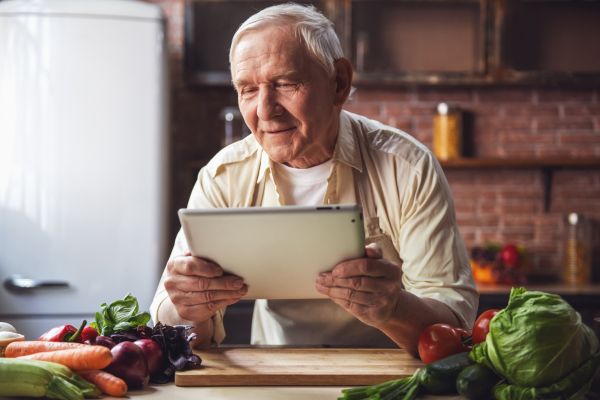Inviting a New Way to Relate to Food and Eating with Cancer
by Stephanie Meyers, MS, RD, LDN
A cancer diagnosis can understandably lead to a lot of questions and fears about things like food, and searching for answers can bring up a whole range of feelings. Headlines like “Red Meat, Salt and Alcohol to Blame for Cancer,” can lead to worries about “not eating well enough.” And even if you talk with a trusted healthcare provider and understand that cancer isn’t caused by a single food group, it can still be hard not to internalize food and diet-related messages. With so much misinformation about nutrition and cancer, along with potential changes in taste and appetite related to treatment, it’s easy to see how eating can be stressful when you’re dealing with cancer.
If you feel worried about food and drinks and how they relate to cancer risk, there’s a skill you can practice to bring more peace and ease to your life as an eater. Maybe you’re finding that food-related decisions cause you to question things in a new way – like whether it’s okay to add sweetener to your coffee or eat a cheeseburger every now and again? Perhaps these worries creep up many times a day and are getting in the way of you feeling confident living your life while coping with cancer. If this sounds familiar, learning more about self-compassion may be helpful for you.
Self-Compassion as a way to cope with difficult feelings about food
Learning to practice self-compassion is a valuable way to care for yourself when it comes to food. Self-compassion means treating yourself with the same kindness you would offer a close friend. As an example, imagine your best friend saying: “I’m so lazy about food. I make bad choices all the time and that got me into this health mess.” How would you reply to that friend? Would you say, “You’re right – you’re a slacker who doesn’t ever seem to care about what you eat. No wonder you got sick!” My guess is that you probably wouldn’t say hurtful things or shame your friend like that. And yet, this is often exactly how we talk to ourselves about food and eating. Practicing self-compassion gives you skills and the ability to change that. The point isn’t just to give yourself “a free pass,” but to explore self-compassion because it’s an approach with proven benefits.
Self-compassion was pioneered by psychologist Kristen Neff, PhD, and in her research and teaching self-compassion consists of three main pillars.
The first is mindfulness, which means noticing when negative thoughts or doubts start creeping in. This is critical because you cannot start to address this kind of thinking unless you are aware of it.
The second element is common humanity – recognizing how many others have these same thoughts. Feelings of self-blame like, “how I ate contributed to my diagnosis,” are extremely common among those with cancer, and knowing you aren’t alone in these feelings can help.
The third piece is self-kindness, which happens in moments where you consciously practice saying something to yourself that’s as gentle and caring as what you’d say to a friend if they were in the same situation.
Self-compassion is a practice that’s helpful across all aspects of life, including food and eating. Research shows higher levels of self-compassion are linked with higher diet quality, more intuitive eating, and lower levels of emotional eating.
Putting these three parts together, self-compassion practice is about being mindful of unhelpful thoughts as they occur, checking in with yourself to recognize that others likely share this or similar hardships, and choosing to use words (even inner dialogue words) that treat yourself with the same kindness and compassion you would offer a beloved friend.
Let’s give this a try right now by revisiting the example from above. What would you say to a dear friend who was being hard on themselves for how they eat? Would you say something like, “You’re going through a really hard time right now and doing the best you can. You didn’t cause this to happen and you deserve to feel comfortable about food.” Re-read that quote but this time say it gently to yourself. This is one way self-compassion can help you care for yourself around food.
Being kind to yourself as an eater takes practice and may feel awkward at first, but it’s worth trying because the benefits are far-reaching and significant.
The benefits of self-compassion
Self-compassion is a practice that’s helpful across all aspects of life, including food and eating. Research shows higher levels of self-compassion are linked with higher diet quality, more intuitive eating, and lower levels of emotional eating. This is worth noting if you’re aiming to change behaviors such as how and what you eat.
Many people believe that being hard on themselves is part of how they’ll accomplish their goal(s). Interestingly, the research on self-compassion proves just the opposite. Studies show that people who are self-compassionate actually have an easier time making long-term health-related behavioral changes. What’s also clear from the research on self-compassion is that it’s not isn’t just a temporary coping mechanism – it truly can improve the lives of those with cancer.
Research on self-compassion practice among people with cancer finds that self-compassion lowers depression, anxiety, and fatigue over time. Additional studies have found a correlation between self-compassion, mindfulness, and better quality of life when living with cancer.
Getting started with a self-compassion practice
If you’re curious about self-compassion and would like to learn more, working with a licensed mental health therapist can help. They can guide you on the practice of self-compassion in your own life and help you strengthen this skill in all situations.
If you’re looking to practice self-compassion but aren’t able to find or access professional help, The Mindful Self-Compassion Workbook from Kristen Neff and Christopher Germer is a great place to start. The workbook explains the pillars of self-compassion and offers a user-friendly, do-it-yourself approach to learning it. You can also find many resources online, including Free Mediations & Practices at the Center for Mindful Self-Compassion.
The takeaways on self-compassion
The purpose of self-compassion is not to get rid of negative thinking or feelings of doubt around food. Unhelpful thoughts about food and eating will still pop up, but self-compassion gives you a way to work with those feelings instead of being overcome or stuck in a cycle with them.

Stephanie Meyers is a Senior Registered Dietitian and Nutritionist at Iris Oncology where she develops and delivers innovative digital cancer nutrition care. She has 25 years of experience as a cancer specialized dietitian and is the former Nutrition Manager in The Zakim Center for Integrative Therapies and Healthy Living at Dana-Farber Cancer Institute in Boston, MA. Stephanie presents seminars world-wide on cancer survivorship, mindful eating, and family nutrition. She is also the author of, End the Mealtime Meltdown: Using The Table Talk Method to Free Your Family From Daily Food Struggles and Picky Eating and the founder of Families Eating Well, a nutrition practice helping parents coach healthy eating skills in kids.


